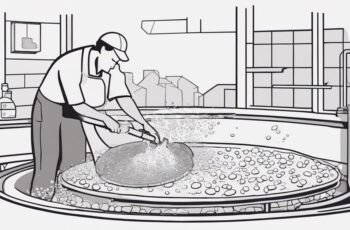When it comes to maintaining a pleasant environment around your septic tank, ensuring adequate ventilation is key.
But what if there were simple yet effective ways to enhance this ventilation system, ultimately reducing those unwanted odors?
Imagine a scenario where foul smells are a thing of the past, and you can enjoy your surroundings without any discomfort.
Let's explore some practical strategies and maintenance tips that could make this a reality for you.
Key Takeaways
- Proper ventilation prevents septic tank odors by controlling gas buildup.
- Regular maintenance and cleaning reduce foul smells and blockages.
- Strategic vent placement and filters enhance airflow for odor elimination.
- Upgrading plumbing fixtures and vent pipes enhances overall septic system ventilation.
Importance of Septic Tank Ventilation

Improving septic tank ventilation is crucial for effectively controlling and eliminating odors emanating from the system. Ventilation benefits are essential for maintaining a healthy septic system. Proper airflow helps prevent the buildup of noxious gases that can lead to foul odors. By allowing fresh air to circulate through the tank, you can significantly reduce the risk of unpleasant smells seeping into your surroundings.
Odor prevention is a key reason why adequate septic tank ventilation is necessary. Without proper airflow, anaerobic bacteria flourish in the septic tank, producing hydrogen sulfide and other malodorous compounds. These gases can escape into the air and create a persistent stench around your property. To combat this issue, ensuring that your septic tank is well-ventilated is crucial. By enhancing ventilation, you create an environment that discourages the production and accumulation of these foul-smelling gases, ultimately leading to a more pleasant living environment.
Common Causes of Septic Tank Odors
Common causes of septic tank odors can typically be attributed to factors such as improper maintenance, clogs in the system, and the presence of certain bacteria.
- Improper Maintenance: Neglecting regular septic tank maintenance, such as infrequent pumping or neglecting to inspect the system, can lead to the buildup of sludge and scum, causing foul odors to emanate from the tank.
- Clogs in the System: Blockages in the pipes leading to or from the septic tank can result in sewage backup and odors escaping through drains or the tank itself.
- Presence of Certain Bacteria: Specific types of bacteria present in the septic tank can produce hydrogen sulfide gas, known for its characteristic rotten egg smell.
To prevent septic tank odors, it's crucial to address these common causes promptly. Regular maintenance, timely removal of clogs, and ensuring a healthy bacterial balance within the tank are key steps in odor prevention. By understanding these factors, you can effectively tackle septic tank odors before they become a persistent issue, potentially avoiding the need for extensive ventilation solutions.
Strategies for Better Ventilation

To enhance septic tank ventilation for effective odor control, implementing strategic airflow management techniques is essential. Ventilation solutions play a crucial role in maintaining a healthy septic system. One effective strategy is to ensure proper placement of vents. Vents should be located away from windows, doors, and areas where people gather to prevent odors from entering living spaces. Additionally, installing a vent pipe extension can help direct odors away from the house.
Another key aspect is to consider the height of the vent pipe. The taller the vent pipe, the better the airflow and dispersion of odors. Regularly inspecting and cleaning the vent pipe to prevent blockages is also vital for odor prevention. Furthermore, utilizing vent pipe filters can help trap odor-causing particles before they're released into the air.
Maintenance Tips for Odor Control
For optimal odor control in septic tanks, prioritize consistent maintenance practices to ensure long-term effectiveness. By implementing regular inspections and plumbing upgrades, you can significantly reduce unpleasant odors emanating from your septic system.
Maintenance Tips for Odor Control:
- Regular Inspection: Conduct routine inspections of your septic tank to identify any potential issues early on. Look for leaks, cracks, or blockages in the system that could be contributing to odor problems.
- Plumbing Upgrades: Consider upgrading your plumbing fixtures to prevent leaks and ensure proper ventilation. Installing a new vent pipe or improving the existing one can help eliminate odors more effectively.
- Proper Waste Disposal: Be mindful of what you flush down the drains. Avoid disposing of items that can disrupt the balance of bacteria in the septic tank, leading to foul odors.
Conclusion
In conclusion, improving septic tank ventilation is essential for controlling odors and maintaining a healthy environment.
Just like a well-oiled machine, ensuring proper airflow and ventilation in your septic system will prevent unpleasant odors from escaping and causing discomfort.
By implementing the strategies and maintenance tips outlined in this article, you can effectively manage septic tank odors and keep your system running smoothly.

